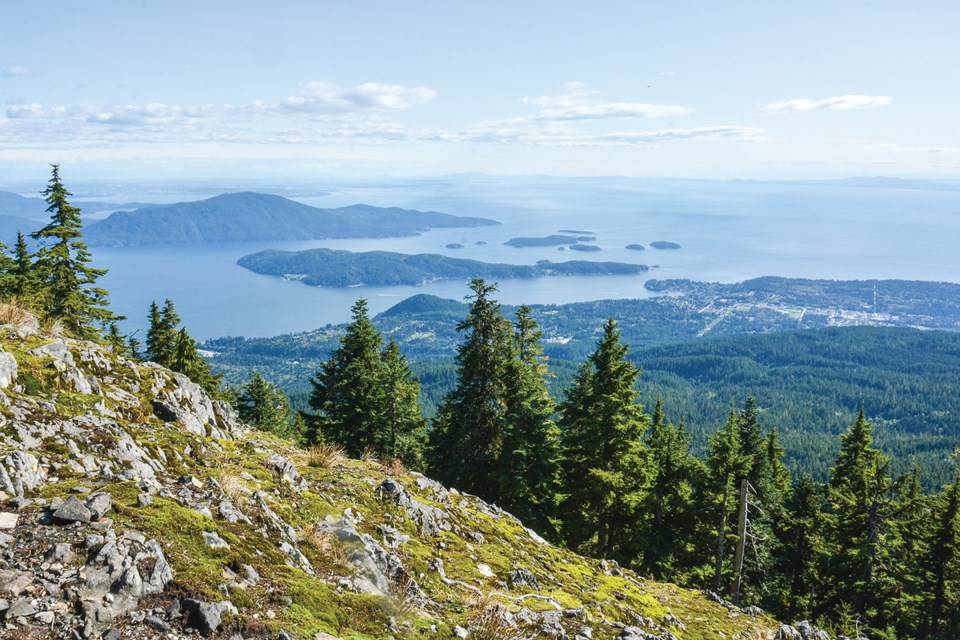As the hiking season takes off on the trails, a new guidebook is hitting the shelves.
Stephen Hui’s second guidebook Destination Hikes In and Around Southwestern British Columbia – out May 11 – follows his popular 2018 guide 105 Hikes In and Around Southwestern British Columbia. The author himself says he thinks Destination Hikes is even better than his last.
Destination Hikes includes a little more than half as many hikes as his previous guidebook, but gave Hui the space to include more details, historical context, directions and photos for each. Hui told Coast Reporter it serves as a companion book to 105 Hikes, and features 55 new hikes chosen for special features such as swimming holes, waterfalls and views.
On the Sunshine Coast, Hui chose three summit hikes to highlight: Gambier Island’s Mount Killam, Mount Elphinstone (a really well-built trail, Hui says) and Mount Hallowell in the Pender Harbour area. Each has, naturally, coastal mountain views.
Mount Elphinstone covers the shortest distance of the three hikes, yet the highest elevation, particularly showcasing the Tantalus Range and a “glorious view” all the way to Mount Baker. All of the Sunshine Coast hikes featured require several hours, and are rated by Hui as moderate with reasonably obvious paths.
Of the three, Mount Hallowell in Spipiyus Provincial Park also features a waterfall and an old fire lookout.
“Because they’re built to see this rugged terrain, they tend to have quite great views [from] a wide angle,” Hui said of lookout towers. He notes the structure is quite deteriorated, and could use some preservation.
In his decades of hiking experience in southwestern B.C., Hui said some of the best mountaintop sunsets he’s seen have been on the Sunshine Coast, and he likes the quieter nature of the trails.
With pandemic restrictions and safety measures came an “explosion of interest in hiking,” Hui said, which can help deal with anxiety and stress.
The pandemic, he says, has “inspired a healthy, enjoyable habit for a lot of people that they’re probably going to keep, but it has led to mob scenes on popular trails, parking issues, even large crowds.” Those have also sparked a conversation in the hiking community about what’s appropriate and safe.
As for publishing a guidebook in a pandemic, Hui said he thinks the timing is great as people continue hiking or gear up for the summer season. The guidebook can also be used to look forward to future plans. For Hui, it was important to include up-to-date directions as well as safety and ethical practices in Destination Hikes.
“For me, growing up before social media, what I learned about the outdoors comes from Scouts, it comes from outdoor education and outdoor club programs in public school. It comes from being a member of hiking clubs, and a lot of it comes from reading guidebooks,” Hui said, adding he owns more than a dozen guidebooks himself.
He understands the concerns residents may have about beloved local areas becoming overrun, but points out that a guidebook provides much more context and information to protect both the users and the area – unlike, say, a single photo and caption on social media that doesn’t share the full story yet can cause a spike in visitation.
“I think guidebooks are a huge, important conduit for passing on the knowledge from generation to generation, particularly information about safety and ethical practices, how to translate the environment, and things we can do to make things better for wildlife but also better for our fellow humans,” he said. They also distribute that information not just to a select, privileged group.
Hui says he particularly likes helping people connect information to trails that they wouldn’t have picked up just from going there, such as information on conservation efforts or the cultural history.
On May 25, Hui was part of a virtual forum on the changing nature of hiking culture hosted by the Vancouver Public Library. In part to celebrate the launch of Destination Hikes, the panel discussed diversity and representation in the outdoors, the impact of the pandemic and social media, and what kind of culture change is happening on trails. It can be watched on the library’s Facebook page.
The first annual BC Trails Day will be on June 5 to celebrate international Trails Day, as the Outdoor Recreation Council of BC invites people to take part in local trail cleanups and virtual educational events.
As for what readers and trail-goers get out of his latest contribution, Hui said he hopes they find some new paths, enjoy themselves and learn something new.
“I just can’t wait to see it in people’s backpacks on the trail.”



